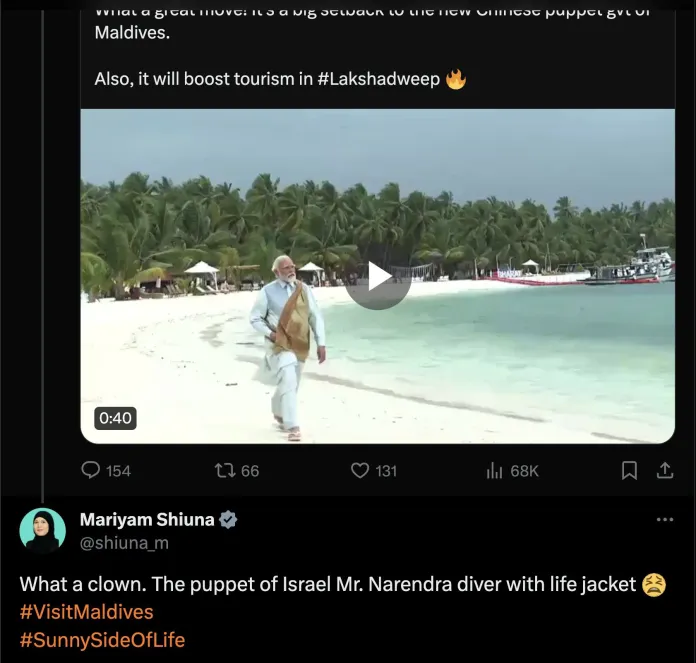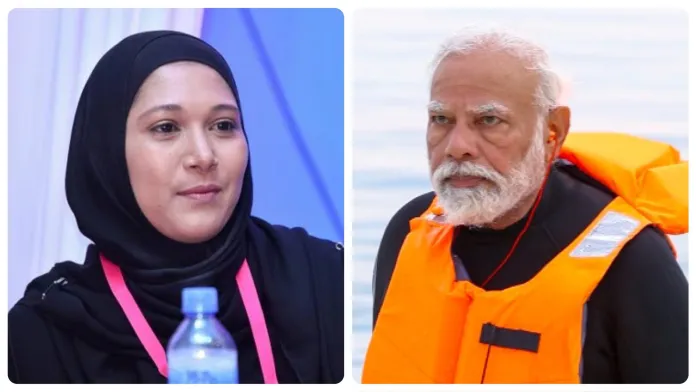In a shocking turn of events, the official websites of the Maldivian President, Foreign Ministry, and Tourism Ministry are currently inaccessible, indicating a suspected cyber attack. This comes just hours after Maldivian social media platforms were flooded with derogatory posts targeting India, Indians, and Prime Minister Narendra Modi in response to his visit to the Lakshadweep Islands.
The cyber attack is believed to be in direct retaliation to a barrage of offensive posts by a pro-Maldives social media account, condemning India and PM Modi. Notably, these online assaults triggered not only reactions from social media users but also drew uncharitable and deplorable language from ministers and other prominent figures in Maldives.
BIG: Maldives President, Foreign Ministry and Tourism Websites go down and are unreachable. Development hours after Maldives Government sponsored trolls attacked India and Indian Government with vile remarks even after years of Indian Govt support to Maldives. pic.twitter.com/6AqirqNlnm
— Aditya Raj Kaul (@AdityaRajKaul) January 6, 2024
Deputy Minister of Youth Empowerment, Information, and Arts, Mariyam Shiuna, took to Twitter to make insulting remarks against PM Modi, referring to him as a ‘clown’ and a ‘puppet of Israel.’ In response to the backlash, the post was later deleted. Shiuna also expressed the view that the Maldives does not require the presence of the Indian Military in the region.
Recently, I had the opportunity to be among the people of Lakshadweep. I am still in awe of the stunning beauty of its islands and the incredible warmth of its people. I had the opportunity to interact with people in Agatti, Bangaram and Kavaratti. I thank the people of the… pic.twitter.com/tYW5Cvgi8N
— Narendra Modi (@narendramodi) January 4, 2024
These inflammatory remarks were not limited to social media users, as Council member of the ruling Progressive Party of Maldives (PPM), Zahid Rameez, joined the fray with highly racist comments against Indians. The provocations intensified after PM Modi shared pictures of his Lakshadweep visit, with several social media users in India advocating the scenic island as an alternative to foreign destinations, including the Maldives.

This social media spat has escalated tensions between the two nations, with Indian users reminding their Maldivian counterparts of India’s intervention in 1988 when Indian troops thwarted a coup attempt within hours of receiving an SOS message from the then President of Maldives, Maumoon Abdul Gayoom.

The 1988 coup attempt, orchestrated by Maldivian businessman Abdullah Luthufee and PLOTE leader Uma Maheswaran, sought to destabilise the Maldivian government. The Indian Armed Forces, responding promptly to President Gayoom’s request for intervention, executed Operation Cactus, successfully restoring order and preserving democracy in the Maldives.
The operation involved the deployment of around 1,600 Indian personnel, including paratroopers, who swiftly neutralised the rebels and secured President Gayoom. The attempted escape of the rebels on a hijacked merchant vessel was intercepted by Indian paratroopers, and the subsequent hostage rescue operation carried out by the Indian Navy resulted in the arrest of the culprits.
Despite occasional political fluctuations between India and the Maldives over the years, the 1988 operation known as Operation Cactus has been a crucial factor in strengthening diplomatic ties between the two nations. It has received global acclaim, with US President Ronald Reagan commending it as a “valuable contribution to regional stability,” and British Prime Minister Margaret Thatcher expressing gratitude for India’s role in saving President Gayoom’s government.
The current cyber attack on Maldivian government websites, coupled with the inflammatory remarks on social media, adds a new layer of tension to the historical relationship between India and the Maldives. As both nations navigate through this diplomatic challenge, the echoes of Operation Cactus serve as a reminder of the intertwined history that has shaped their ties. The international community will be closely watching the developments to gauge the impact on regional stability and diplomatic relations.




















Comments